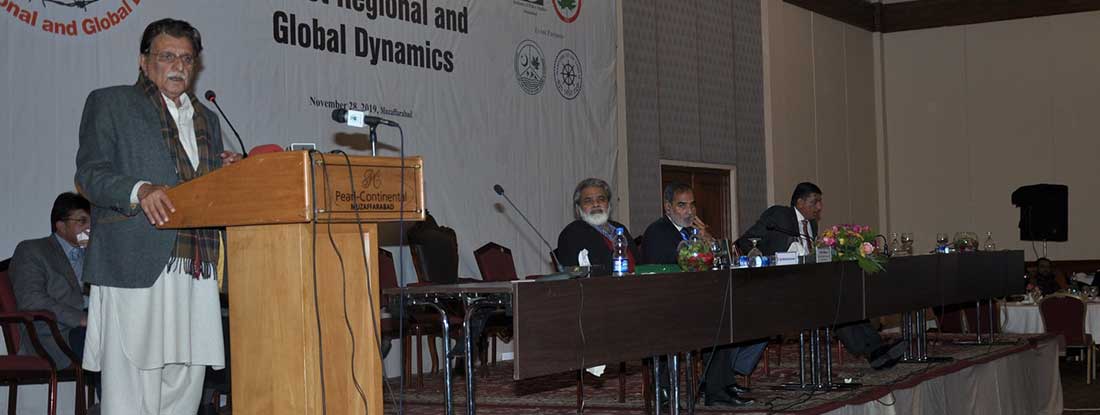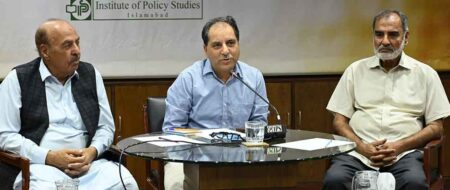The Crisis in Kashmir amidst Regional and Global Dynamics
Kashmiris-led, Kashmiris-owned solution urged to resolve crisis, avoid imminent war
The
abrogation of the so-called autonomous status of Indian occupied Kashmir has
exposed the true nature of false Indian democracy and brought the subcontinent
to the brink of a nuclear war. The conflict, if not resolved peacefully and
timely, not only can jeopardize the stability of the region but will also have
implications far beyond the continent. The crisis has remained unresolved for
decades for want of more efforts that are led and owned by Kashmiris.
This
was heard repeatedly at the international seminar titled “The Crisis in Kashmir
amidst Regional and Global Dynamics” which was organized by Institute of Policy
Studies (IPS), Islamabad in collaboration with Policy Research Forum AJK
(PRFAJK) and Maritime Studies Forum (MSF) in Muzaffarabad, AJ&K on November
28, 2019 to dig deep into the Kashmir crisis and come up with policy
imperatives.
The
seminar was attended by a variety of international and national leaders,
experts and scholars including Prime Minister of AJ&K Raja Farooq Haider,
Khalid Rahman, Executive President IPS, Dr Syed Anwar, law expert, Mansoor
Qadir Dar, Acting Chairman PRFAJK, Dr Roger van Zwanenbarg, British historian
and political economy scholar, Dr Yashpal Amarchand Tandon, author and
political activist from the UK, Dr Akis Kalaitzidis, American scholar and
author, Dr Halil Toker, Turkish scholar, Syed Iftikhar Gilani, senior
journalist from IoK, Dr Fazl ul Hadi Wazeen, academic and politician from
Kabul, Farzana Yaqoob, political activist, and many others.
The
speakers were of the opinion that a multidimensional approach – including
diplomatic, legal, social, etc – is needed to resolve the long drawn out issue.
They exposed the vulnerability of the UN in coming up to expectations of
millions of Kashmiris and stressed self-reliance in dealing with the aggression
of the fascist Modi regime. They said the revocation of Articles 370 and 35-A
are an act of stripping Kashmiris of their religious and cultural identity and
is tantamount to razing the Babri mosque.
The
conflict of Kashmir needs sustainable efforts from the Kashmiri diaspora living
across the globe. The way Kashmiris have fought their case globally and
sensitized international media is commendable but more consistent endeavors are
required. Speakers coming from Indian occupied Kashmir expressed concern over
the lack of concrete measures on the part of the government of Azad Jammu and
Kashmir. They also revealed the scale of torture unleashed upon Kashmiris
trapped in the occupied valley. They termed modern India a racist country where
rights of minorities let alone Muslims are being snatched. It was also
highlighted that the textbooks in India contain venomous content aimed at
spreading religious hatred to pave the way for establishment of Akhand Bharat.
The
speakers said that pessimism and dejection will not help the Kashmir cause and
rather prove counter-productive. It is true that Muslim countries, especially
the Arab world, were not quite vocal in condemning the unilateral scrapping of
the especial status of Kashmir. Yet, it would be unwise to fall prey to the
Indian propaganda that other Muslim countries have abandoned Kashmiris.
It was also mentioned that a government in exile representing the people of Indian occupied Kashmir needs to be set up in Muzaffarabad as this would strengthen the freedom struggle. In addition, IoK must be added to the list of Unrepresented Nations and Peoples Organization, and Non-Self-Governing Territories in the UN.












